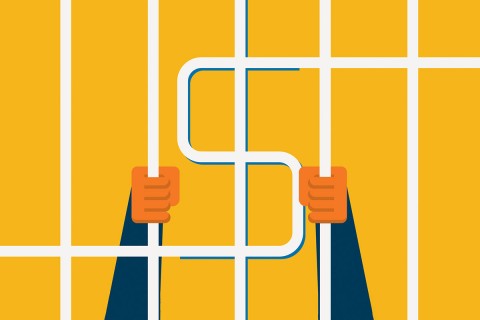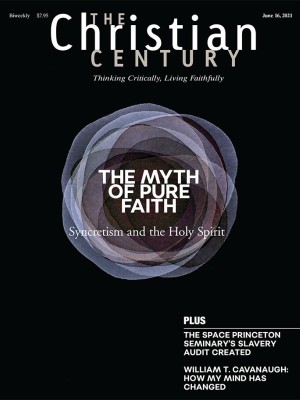How faith-based organizing helped end money bail in Illinois
The Bible provided some healthy agitation as we built coalitions to literally set the captives free.

In a church basement on the South Side of Chicago in 2016, a multiracial group of about 20 clergy, congregants, and community organizers gathered to reflect together on the intersection of faith, justice, and mass incarceration. We started with a role-playing exercise. Each participant was given a slip of paper that described a hypothetical crime and the alleged perpetrator’s age, race, family members, and prior convictions. Discussion leaders—activists who were familiar with bond court—played the roles of judge and prosecutor.
One by one, each participant stood before the judge. For each case, the judge asked the prosecutor about the alleged crime, engaged in discussion for less than a minute, and then pronounced either a bail amount or release until trial. These decisions were arbitrary, but they stayed within the bounds of what the person playing the judge had observed in real-life bond court proceedings.
Read our latest issue or browse back issues.
After the exercise, people shared a variety of reactions. Some were shocked that such a mockery of a process was used to make far-reaching decisions about people’s lives. Others were not surprised because they had some experience with the criminal court system, either as defendants or in support of others. Everyone in the room was angry and committed to work together to fight this unjust system that devastates the lives of hundreds of thousands of people, especially Black people and poor people.
It has been a long fight, but this year we won an important victory. In February, Illinois governor J. B. Pritzker signed into law the Pretrial Fairness Act, which will end money bail and dramatically reduce pretrial incarceration. Its passage followed a multiyear campaign involving more than 125 coalition partners across the state.
Faith-based community organizing played a key role in this victory. Our involvement began in 2015, when the People’s Lobby, an organization we both serve, started talking about the racist system of policing and incarceration in the Chicago region and its impact on Black communities. We identified money bail as one element of the system that we needed to dismantle. Unaffordable bail amounts often function as an entryway into longer-term incarceration by pressuring people to take plea bargains before they have the chance for a trial.
We launched a series of listening sessions and popular education workshops in churches. In many congregations, we found members and leaders who had been impacted by pretrial incarceration. Many of these people had never told one another about their experience with the criminal court system. The workshops helped them process and politicize these experiences. Moving past shame and self-blame, they got angry at the system and decided to take action to change it.
At the same time, pastors began addressing mass incarceration in sermons and Bible studies, helping people more deeply connect their lives and communities with the theology of building a society around redemption and healing rather than punishment and violence. Isaiah 1 provided some healthy agitation around the church’s need to engage more actively with the systems that devastate our communities. We talked about Isaiah’s warning that all of our solemn assemblies, appointed festivals, and prayers are not only irrelevant but futile abominations that make God angry if we do not seek justice and help the oppressed.
We found inspiration in passages like John 3:17, in which Jesus says, “God did not send the Son into the world to condemn the world, but in order that the world might be saved through him.” This orientation, repeated throughout the Gospels, is diametrically opposed to the approach of the US criminal legal system. That system—which is reminiscent of the Roman system that killed Jesus—deals with people who are accused of causing harm to people or property by dehumanizing them and effectively throwing them away.
As two umbrella groups, the Coalition to End Money Bond and the Illinois Network for Pretrial Justice, organized a broad campaign, faith communities brought a unique moral voice to public conversations about money bail. In February 2017, faith leaders organized a protest of President Trump’s attempts to escalate law enforcement’s war on Black people. At the same time, they called on Tim Evans—chief judge of Cook County, which includes Chicago—to end the use of money bail.
To dramatize the transformation of policing and incarceration needed to make our faith real in the world, clergy and lay leaders built a mock jail cell in the street. Then they dismantled it and turned it into a banquet table, before being arrested for civil disobedience.
Dwayne Grant, a South Side pastor who had once been locked up for two weeks pretrial—leaving his wife and five daughters scrambling to come up with thousands of dollars in bail—gave a rousing speech exposing the racism and injustice of the system. “Resources, not police forces!” people chanted.
Actions like this built public awareness, secured positive coverage in mainstream media, and helped push decisionmakers to change their policies. At the same time, non-faith-based partners were employing a variety of strategies and tactics. Eventually Evans altered the bail practices of Cook County judges in a way that significantly decreased the number of people locked up pretrial on unaffordable money bonds.
Support for ending money bail gained momentum during the pandemic, especially when ten people incarcerated at the Cook County Jail contracted COVID-19 and died of it. Following the racial justice uprising triggered by the killing of Breonna Taylor and George Floyd, the Illinois Legislative Black Caucus decided to pursue a major package of criminal justice reforms, including the end of money bail.
A key front in the campaign was “swing” areas, regions where legislators had less history of supporting criminal justice reform and community organizers had less history of changing legislators’ minds. Because faith communities have denominational networks that cross urban/suburban/small-town/rural lines, religious leaders were able to provide a unique geographical breadth of relationships. When 200 faith leaders signed a letter supporting the legislation, it was announced in a virtual press conference that happened simultaneously in six locations across the state. Sally Dyck, then bishop of the Northern Illinois Conference of the United Methodist Church, wrote an op-ed against money bail in the Chicago Sun-Times. These actions prompted further faith-based organizing that effectively pushed swing legislators to support the Pretrial Fairness Act.
Illinois is the first state to entirely eliminate money from pretrial decision making. It also sets the strictest standards in the country to limit the cases in which people can be incarcerated while presumed innocent before trial. One significant provision that was controversial in some quarters is that the legislation overhauls the system for all people awaiting trial, not only those accused of nonviolent or low-level offenses. Judges and prosecutors will be allowed to imprison people until trial only in the most exceptional circumstances: when someone is accused of a violent crime and evidence presented in a hearing demonstrates that they would pose a “specific, real, and present threat” if released.
This is important. Freeing only those accused of nonviolent offenses would help a minority of the people harmed by pretrial incarceration, sabotage the presumption of innocence, and affirm the false premise that incarceration is an effective and acceptable solution to violence. The Pretrial Fairness Act represents a step away from a carceral order based on punishment and toward a community-centered approach that provides resources and healing.
Throughout this effort, faith communities helped keep people focused on the true possibility of change, despite what sometimes seemed like insurmountable odds. Jesus was arrested, incarcerated pretrial, and executed. In the end he triumphed anyway, and ultimately the Roman Empire fell.
That message is especially important when it comes to the criminal court system, as Black people have experienced the long arc of oppression through the transition from slavery to mass incarceration. The campaign to defeat money bail in Illinois shows that the biblical imperative to set the captives free is still relevant today—and that when faith communities join a broader coalition to fight strategically over the long haul, we can win.
A version of this article appears in the print edition under the title “Literally freeing captives.”





